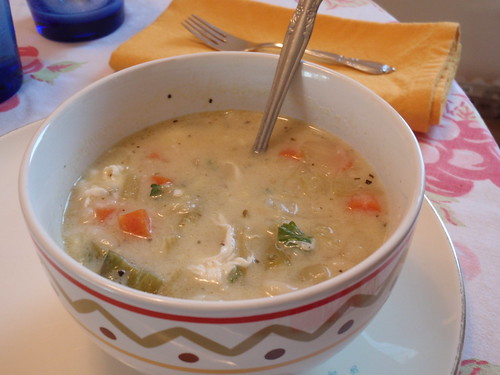As often as I cook, you wouldn’t expect that I usually feel a certain resistance to the idea of cooking, especially after a day at work. I don’t always step into the kitchen filled with joy and delight. Sometimes, I look at the kitchen, and I think about the minutes I’ll spend on my feet, the dirty dishes that will pile up on the stove and in the sink. I think about how fast the meal will be eaten and how there’s no one at the table with me. Sometimes, honestly, a bowl of cereal sounds far more appealing than cooking a respectable, grown-up dinner.
But then I step into the kitchen, pull out the chopping block, and get to work. I measure the olive oil into my soup pot, crank up the heat, and I start chopping. I was doing all of this last night when it occurred to me that my feelings toward the kitchen are analogous to the concept of activation energy. I’ve always loved the idea of activation energy because it seemed to explain so well my experience of the world. I’m not someone who is bouncing around with energy at all hours of the day. I have to dig around inside to find the motivation to do things that yes, I really want to do. Yet it’s still an effort to do them, with the exception of a few things, like pleasure reading.
In chemistry, there’s this concept of activation energy, which is the idea that all matter exists at different levels of energy. For some crazy reason known as entropy, chemical reactions that allow matter to exist in a lower energy state can occur spontaneously, with no input of energy. However, most reactions need some energy to make the transition happen, and that energy is called activation energy.
The human equivalent is how a human being can transition from a more high-energy state—say, the frazzled post-work condition in which you might see me on any given workday—to a lower-energy state—say, me after dinner and a glass of wine. That, my readers, is where cooking enters the equation. Though it takes energy to make dinner happen, with me standing at the stove stirring, by the end of the meal, I’m a happier and more relaxed human. So all that energy it takes to make dinner happen? It’s totally worth it.
PS The soup up there in the photos is a Greek Avgolemono Soup, a recipe I posted long, long ago. It is one of the best soups I’ve ever made, like chicken noodle soup for the vegetarian set. The version I made this week used fresh mint instead of fresh parsley, and it’s a really nice variation if you like mint.




4 comments:
I love this concept of activation energy! I often feel the same way - sometimes I WANT to do something (go running, cook dinner, clean my office) but the first few steps are always the hardest. Then, once I get going, I'm off! I'm glad there's a scientific explanation for this phenomenon. :)
Hee hee! Science--it explains everything. I suffer from high activation syndrome, so I play all sorts of mind games with myself--just get started, just 5-10 minutes, just try to read 2 pages of this boring article...and somehow it works well enough so I can get (most of) my work and chores done. It doesn't help that I'm kind of a perfectionist, but oh well!
although there's a tad too much science for my sunday morning reading, i totally agree :) i tend not to think about the dishes... until i'm cursing the fact i haven't found someone to clean them, hehe
Ha! Sorry about the science overload, Shannon...I can imagine how you feel. You make the rounds, checking your blogs for new reading, and I've let you down by talking about science in a space where we are SUPPOSED to be talking about dinner and cookies. I know. I'm sorry about that :-)
Post a Comment